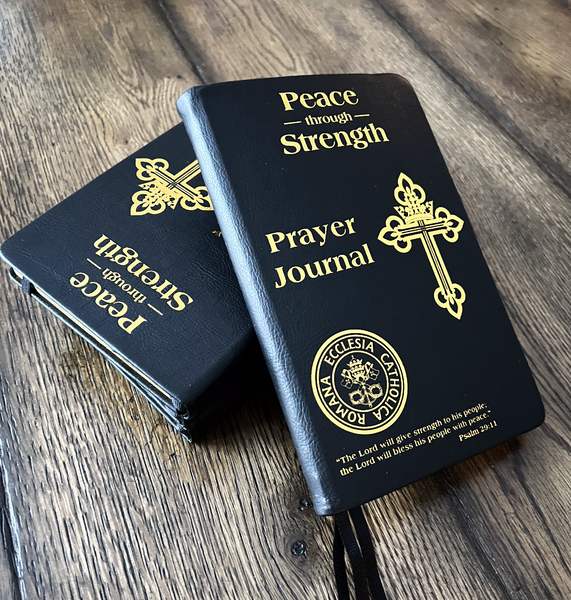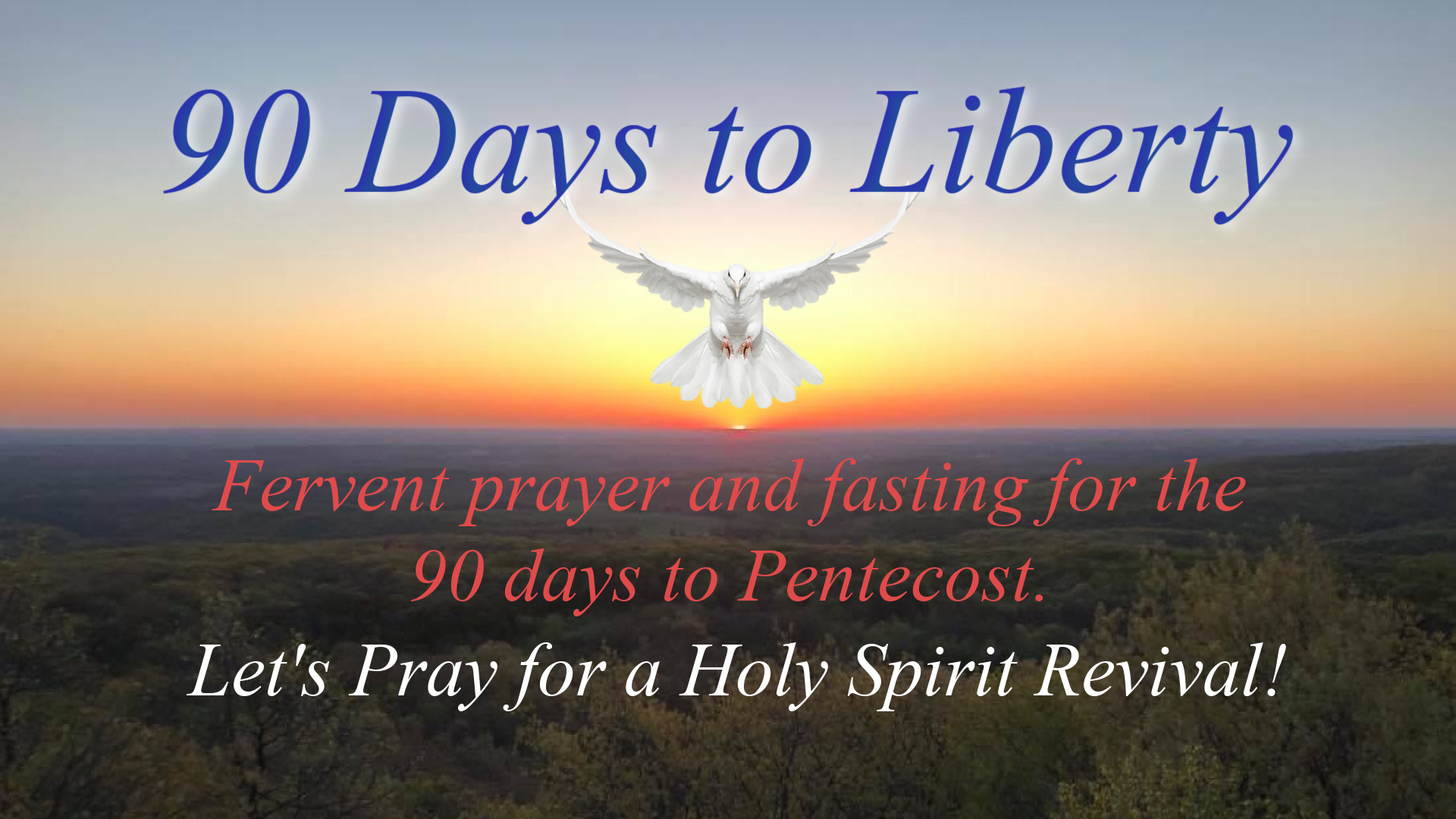Day 12 – 90 Days to Liberty
by Fr Richard Heilman | March 10, 2023 12:05 AM
My Morning Prayer Sampler
For me, it starts by clearing the cobwebs. I jump out of bed and I am into the shower, get dressed and pour myself a nice cup of coffee. I want to get up at a time when I don’t feel rushed to meet my daily duties. Mornings (after a shower and my first few sips of coffee) are quality time for me. It’s uninterrupted time with just me and my loving God. After a few minutes of quiet time, I begin my prayer.
5:20am – Morning Offering[1] (30 seconds)
5:21am – Spiritual Reading: “Freedom from Stinginess/Miserliness” (below) by Fr. James Altman (4 minutes)
5:25am – Mental Prayer. Using my Peace Through Strength Journal[2], as I sip my coffee, I pray the Preparatory Prayer found in the journal as I spend the first few minutes speaking to God. This can include what or who you are praying for today. I write this in my journal. Then I just sit quietly, allowing today’s spiritual reading to resonate in my heart, while I listen for anything God wants to speak to my heart, which I can write in my journal. Then I pray the Closing Prayer found in my journal. (15 minutes)
5:40am – Pray the Rosary. During these 90 Days I am so looking forward to the peaceful offering of the rosary by Doug Barry in the video below. (19 minutes)
6:00am – Pray the Angelus (1 minute)
Then I spend some time reflecting on today’s readings for Mass, and I am off for a brisk walk with my dog, Gracie (still reflecting on today’s readings). Then, it’s time to head to Mass.
There you have it, like Jesus spending 40 days in prayer in the desert, defeating the devil, we dedicate ourselves to just 40 minutes of prayer each morning, cultivating our love for our Lord and our Lady, filling the house of our soul with their love and God’s grace, which brings peace. Now I am well-prepared to live my day for God, not for me.
Our Daily Prayer for Liberty and for a Holy Spirit Revival
“Free us from every force of oppression, both internally and externally. Grant to our leaders the wisdom to protect and promote our liberties; by your grace may we have the courage to defend them, for ourselves and for all those who live in this blessed land. Heavenly Father, grant a Holy Spirit Revival in our land!” (Based on a prayer by the USCCB)
“Freedom from Stinginess/Miserliness” by Fr. James Altman
Dear family, who is the one person that most often comes to mind when we think of stingy misers? For many it may be the infamous Ebenezer Scrooge, from Charles Dickens’ 1843 novella, A Christmas Carol. At the beginning of the story, Scrooge is a cold-hearted miser who despises Christmas. His attitude can be summed up in two words: “Bah, humbug!” Dickens describes Scrooge as “a squeezing, wrenching, grasping, scraping, clutching, covetous, old sinner! Hard and sharp as flint … secret, and self-contained, and solitary as an oyster.” Yes, that about sums up the image we have when we see Scrooge’s heartless attitude toward his clerk, Bob Cratchit, whose household includes the crippled child, Tiny Tim.
Maybe you, like me, have run into some Scrooges in your lifetime – miserly people who are stingy with their money like Ebenezer Scrooge. The adjective miserly evolved from the Latin word miser, which means “unhappy, wretched.” How often do we see unhappiness and wretchedness in the genuinely stingy and miserly?
Why are the stingy and miserly unhappy and wretched? Because misers are a step beyond mere frugality. They are a leap beyond mere prudence in spending. Misers are those who love the accumulation of money, which brings them into direct conflict with the first commandment, to love God above all things.
Jesus directly taught us on this very issue in a parable entitled The Rich Fool, emphasis on the word “fool”: “There was a rich man whose land produced a bountiful harvest. He asked himself, ‘What shall I do, for I do not have space to store my harvest?’ And he said, ‘This is what I shall do: I shall tear down my barns and build larger ones. There I shall store all my grain and other goods and I shall say to myself, ‘Now as for you, you have so many good things stored up for many years, rest, eat, drink, be merry!’” But God said to him, ‘You fool, this night your life will be demanded of you; and the things you have prepared, to whom will they belong?’ Thus will it be for the one who stores up treasure for himself but is not rich in what matters to God” (Luke 12:16-21).
Perhaps it was grace that inspired Dickens to write The Christmas Carol – grace that enabled him to understand that we are formed by our experiences, but all is not lost. It is not too late; it is never too late, to change. The actual novella opens with a description of Scrooge’s lonely and unhappy childhood, and his aspiration for money to avoid poverty. Unlike the rich fool, Scrooge indeed overcame his early formation and, as we know, when he did there was joy: “I don’t know what to do! I am as light as a feather, I am as happy as an angel, I am as merry as a school-boy. I am as giddy as a drunken man. A merry Christmas to everybody! A happy New Year to all the world! Hallo here! Whoop! Hallo!”
It is not likely that our own transformation from stinginess and miserliness will arise from being visited by three ghosts, Past, Present, and Future; however, we do not need nocturnal visits from ghosts to effect a change in ourselves. Rather, if we are open to it, we may make the effort to ponder our own past experiences, then meditate upon how these experiences have formed us and resulted in our present, and then make a firm purpose to amend our future, an amendment to be less stingy and miserly with anything we have.
Certainly, this applies to any material goods, but perhaps most importantly to our time – time we could spend in prayer of thanksgiving, intercession for others, even imploring God on our own behalf. Indeed, what may be most required of us is our time; it so often is a lot easier to just throw some money at a problem, but extremely difficult to spend some personal time fixing it. How stingy and miserly we are with our time. How little we comprehend the implications of the words God spoke to the rich fool: “this night your life will be demanded of you.”
Dear family, we must examine our lives. As the great Socrates is said to have uttered: “The unexamined life is not worth living” (as described in Plato’s Apology, which is a recollection of the speech Socrates gave at his trial. (38a5–6)). One commentator described the meaning of Socrates’ statement thusly: “It means any life which is not checkmated, unaccountable is not worth living. It tries to emphasize that everyone has to live a life that they should be proud of, a life that they can look back to what they achieved and say yes indeed I made a mark or I have not lived up to my expectations, so I need to make amends.”
We must examine our lives and when we do, let us keep in mind the sobering words of the ghost of Jacob Marley: “‘I wear the chain I forged in life,’ replied the Ghost, ‘I made it link by link, and yard by yard.’” And when we examine our lives let us understand the truth spoken by Scrooge after the visit of the ghost of the Future: “Are these the shadows of the things that Will be, or are they shadows of things that May be, only?” In other words, Scrooge asked it if was too late to change. No, dear family, it is not too late, it is never too late, to change.
Scrooge changed because the three ghosts forced him to examine his life. Let us force ourselves to do the same. After all, that is the whole point of the Examination of Conscience we are supposed to do before entering the Sacrament of Reconciliation. In that examination, let us ask ourselves if we truly love God above all things, or whether we are stingy and miserly with any or many of the gifts God has given us, especially the gift of time. Let us not fear such an examination, but rather revel in the fact that we know transformative grace will come to us through the sacrament. Let us pray that through this transformation it may be said of us as it was said of Scrooge in some concluding words of A Christmas Carol: “And it was always said of him, that he knew how to keep Christmas well, if any man alive possessed the knowledge. May that be truly said of us, and all of us!” (From “Let Freedom Ring[3]“)
You can enlist in the United States Grace Force HERE[4] (please recruit family and friends!)
Information on the United States Grace Force can be found HERE[5]
We highly recommend ordering the book “Let Freedom Ring[3]” authored by Fr. Bill Peckman, Fr. James Altman and Fr. Rick Heilman. This amazing book will be a great tool for easy access, highlighting and bookmarking as you traverse through the first 40-days of our 90 Days to Liberty journey with tens of thousands of other special forces prayer warriors!
You can order the book at RomanCatholicGear.com[6].
You may want to consider using the Hallow App for Lent: Hallow.com[7]
GET YOUR PEACE THROUGH STRENGTH PRAYER JOURNAL …
HERE[8]
 [9]
[9]

- Morning Offering: https://usgraceforce.com/morning-offering/
- Peace Through Strength Journal: https://romancatholicgear.com/collections/grace-force
- Let Freedom Ring: https://romancatholicgear.com/collections/books/products/let-freedom-ring-book
- HERE: https://visitor.r20.constantcontact.com/manage/optin?v=001ESuSGaJpYPCG2iUdd4j4bkKwd4gkh2ZUVbam_Ty9rCn6blH6_U3cI2D8UvSLEcSzHnC4eq2UWmK1I0SbEw0SPKqnkZ2j0Z4J4D-_m4dD6CKJU9day-bBa8Qnx4dv7RLDIVlYAjL1JWsjfUTNPH2jQIVY9gbdbz4O4oMIzv5V1dT_upQsD8cX86iq_5Y-x4eLrTVtdOmA24s%3D
- HERE: https://usgraceforce.com/god-wants-you-enlist-in-the-grace-force/
- RomanCatholicGear.com: https://romancatholicgear.com/collections/grace-force
- Hallow.com: https://hallow.com
- HERE: https://romancatholicgear.com/collections/peace-through-strength-1
- [Image]: https://romancatholicgear.com/collections/peace-through-strength-1
Source URL: https://usgraceforce.com/day-12-90-days-to-liberty/